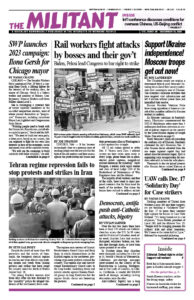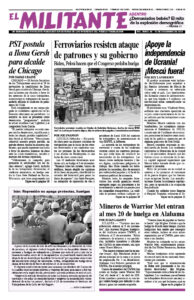The Ukrainian people are waging a determined fight to push Moscow’s invading forces out of their country and restore their sovereignty over all Ukraine. The Kremlin’s incessant airstrikes that have targeted vital infrastructure and left 6 million without power have just intensified their resolve.
Russian President Vladimir Putin faces rising opposition at home as a result of the casualties suffered by Russian workers in uniform.
As Moscow continues its bombardments, Ukrainians commemorated the 1932-33 Holodomor, when more than 3 million perished from starvation as a result of policies imposed on the country by the Great-Russian regime of Joseph Stalin. (See article.)
Today Moscow’s shells are pounding the southern city of Kherson. Residents celebrated the city’s liberation Nov. 11 after Russian forces retreated from the one major regional capital they had seized since the invasion began. Kyiv is organizing train transportation for residents who wish to leave for safer places.
Thousands in the city joined protests after Russian forces seized Kherson at the start of the war. Their actions were brutally suppressed, but opposition to the occupation ran deep.
When Russian soldiers arrived at the Tropinka Hospital they ordered Dr. Leonid Remiga, the chief physician, to take down the Ukrainian flag. “You can shoot me if you want, but I’m not going to do it,” he replied. They left with the flag still up. The staff held off further incursions by Russian forces by feigning a COVID-19 outbreak at the hospital.
After more frustrating visits, Moscow’s forces assaulted Remiga and told him he was to be replaced as head doctor. He suffered a stroke. Hospital staff insisted on holding him for treatment and, with the help of his replacement, he kept running the hospital from his sickbed. When occupying forces finally gained the upper hand in the city, Remiga had to go underground.
As time passed, droves of Russian soldiers turned up at the hospital asking for doctors to diagnose them with ailments to get sent home. Andriy Koksharov, head of the trauma unit, readily signed the requests. “I was ready to sign it for the whole army,” he said.
Soldiers’ mothers protest in Russia
Putin held a televised meeting Nov. 25 with mothers of Russian soldiers who were handpicked to ensure none expressed any opposition to his war. Soldiers’ mothers who have protested the treatment of their sons, including leaders of the widely respected Council of Mothers and Wives, were placed under surveillance and excluded from the much-heralded event.
Making a show of “sharing the pain,” Putin was trying to counter the outcry against the Kremlin’s handling of the war. He told the carefully selected women present that news of Russian battlefield losses are “fake,” and reiterated his regime’s intention to achieve its goals. Putin claims Ukraine has no right to exist.
Since Moscow’s national draft of 300,000 in September, the war’s deadly impact has reached into thousands of homes. Casualties among newly mobilized men have mounted.
“Do you have enough courage to look into our eyes — openly, in a meeting with women that weren’t hand-picked for you?” Olga Tsukanova, a leader of the council, told Putin in a video. “We expect an answer from you. Are you going to keep hiding from us?”
Mothers and wives of soldiers in Russia have long had a well-earned reputation for organizing opposition to the deadly consequences of the regime’s wars. In the 1994-96 war in Chechnya, as well as in Moscow’s earlier war in Afghanistan, mothers initiated protests and collected signatures across Russia to demand their sons be brought home. They led a march to the Chechen capital, Grozny.
Despite serious efforts to muzzle them today, soldiers’ relatives continue to speak out. The Council of Mothers and Wives held a news conference in Moscow Nov. 20 where many told their stories. Yelena Kostina said her nephew was sent from the Lipetsk region in western Russia to the front lines only eight days after he was mobilized. Yelena Kalimysheva described how her brother was thrown into battle without any supplies and abandoned by his commanders.
“They have humiliated, deceived and bullied us, so women, we have nothing to be afraid of,” said Tsukanova, whose own son has been drafted. With over 500 members, the council has been flooded with thousands of calls for help from across Russia.
Putin was confronted with protests when he visited Armenia Nov. 23 to attend a summit of the Moscow-led Collective Security Treaty Organization, a military bloc that includes the governments of Armenia, Belarus, Kazakhstan, Kyrgyzstan and Tajikistan. Demonstrators included recently arrived emigrants from Russia. Since the invasion of Ukraine, Moscow’s authority in Central Asia and the South Caucasus has dwindled as capitalist governments there take their distance from Putin and his war.
“We have nothing against the Russian people — but we do not want to be slaves of the Kremlin,” Yuri Tatevasyan told the Moscow Times at one of three anti-war rallies held during the summit.

